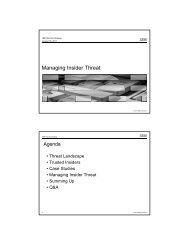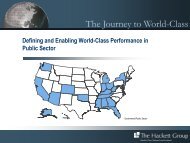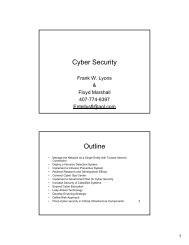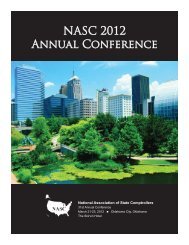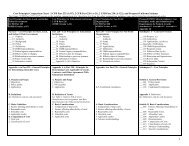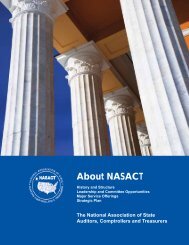Advisory Committee on Tax Exempt and Government Entities (ACT ...
Advisory Committee on Tax Exempt and Government Entities (ACT ...
Advisory Committee on Tax Exempt and Government Entities (ACT ...
Create successful ePaper yourself
Turn your PDF publications into a flip-book with our unique Google optimized e-Paper software.
The Appropriate Role Of The Internal Revenue Service With Respect To <strong>Tax</strong>-<strong>Exempt</strong> Organizati<strong>on</strong> Good Governance Issuesthe organizati<strong>on</strong> to improve internal financial c<strong>on</strong>trols 170 <strong>and</strong> to make prompter <strong>and</strong>more comprehensive public disclosures, particularly with respect to financial reportingproblems. 171 Public company boards are required, am<strong>on</strong>g other things, to form an auditcommittee comprised wholly of independent directors to hire, supervise, <strong>and</strong> review theperformance of outside auditors <strong>and</strong> to disclose whether there is a financial expert <strong>on</strong>the audit committee. Public company executives must certify resp<strong>on</strong>sibility for financialreports; disclose material weaknesses; <strong>and</strong> assess the internal c<strong>on</strong>trols <strong>on</strong> financialreporting. Outside auditors are prohibited from providing most n<strong>on</strong>-audit services; leadauditors must rotate every five years, <strong>and</strong> the audit firm must report directly to the auditcommittee. The corporati<strong>on</strong> must adopt a code of c<strong>on</strong>duct applicable to its CEO <strong>and</strong>financial pers<strong>on</strong>nel <strong>and</strong> pers<strong>on</strong>al loans to executives <strong>and</strong> directors are prohibited.SOX also required the exchanges to implement certain changes in their rules. Perhapsbecause of the magnitude of the failures, the NYSE 172 <strong>and</strong> other exchanges went wellbey<strong>on</strong>d what was required <strong>and</strong> imposed l<strong>and</strong>mark governance reforms <strong>on</strong> theirmembers. For example, the NYSE requires that the boards of most publicly-tradedcompanies be comprised of a majority of independent directors, have audit,governance, <strong>and</strong> compensati<strong>on</strong> committees comprised solely of independent members,<strong>and</strong> undertake specified tasks, including c<strong>on</strong>ducting an annual self-evaluati<strong>on</strong>, that mustbe set forth in a charter that is posted <strong>on</strong> the corporati<strong>on</strong>’s website.Two questi<strong>on</strong>s then are: (1) what empirical data exists about the efficacy of thesevarious corporate “best practices;” <strong>and</strong> (2) assuming there is evidence of theireffectiveness in the for-profit world, will adopti<strong>on</strong> of those “best practices” by n<strong>on</strong>profitorganizati<strong>on</strong>s similarly achieve positive results.Professor Robert Clark, in a 2005 paper, 173 c<strong>on</strong>sidered the empirical studies involvingSOX-type governance measures <strong>and</strong> publicly-traded corporati<strong>on</strong>s then to date <strong>and</strong>c<strong>on</strong>cluded that “the search for str<strong>on</strong>g empirical evidence supporting a belief that keyitems in the recent wave of corporate governance changes will have a major positiveimpact is generally disappointing.” 174 For example:• Internal C<strong>on</strong>trols – Secti<strong>on</strong> 404. Regarding the internal c<strong>on</strong>trolsrequirements of secti<strong>on</strong> 404 of SOX, the analysis suggested that the benefitsof lower-level fraud detecti<strong>on</strong> are modest <strong>and</strong> he questi<strong>on</strong>ed whether theseinternal c<strong>on</strong>trol provisi<strong>on</strong>s would indeed prevent the high-level fraud seen in170Based <strong>on</strong> our experience <strong>and</strong> interviews for this report, public accountants representing both publicly-traded corporati<strong>on</strong>s <strong>and</strong>exempt organizati<strong>on</strong>s that the financial requirements of SOX, particularly involving internal c<strong>on</strong>trols, have impacted exemptorganizati<strong>on</strong>s; while exempt organizati<strong>on</strong>s are not expected to meet the strict requirements of secti<strong>on</strong> 404 of SOX, accountants aremuch more focused <strong>on</strong> their internal c<strong>on</strong>trols, including in management letters.171See, e.g., Oxholm, supra note 42, at 357.172The NYSE final governance rules enacted in resp<strong>on</strong>se to the corporate failures beginning with Enr<strong>on</strong> <strong>and</strong> the passage of SOXcan be found at http://www.nyse.com/pdfs/finalcorpgovrules.pdf. Other NYSE rules <strong>and</strong> regulati<strong>on</strong>s can be found athttp://www.nyse.com/regulati<strong>on</strong>/rules/1145486472038.html.173See Clark, supra note 43.174Id. at 308.ADVISORY COMMITTEE ON TAX EXEMPT AND GOVERNMENT ENTITIES (<strong>ACT</strong>) June 11, 2008 81






